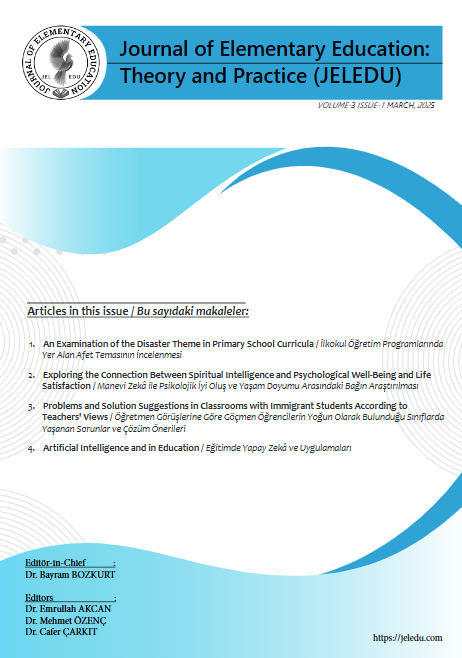Problems and Solution Suggestions in Classrooms with Immigrant Students According to Teachers' Views
DOI:
https://doi.org/10.5281/zenodo.15089615Abstract
In this research, it is aimed to reveal the problems and solution suggestions experienced in the education-teaching process in classes with foreign students. In the research, one of the qualitative research designs, the phenomenological study design was used. The study group of the research consists of teachers working in Gaziantep city center who have foreign students in their classrooms. The study group of the research consists of 25 teachers determined by easy sampling method, which is one of the non-random sampling methods. A semi-structured interview form consisting of five questions developed by the researcher was used as a data collection tool. Content analysis was used to analyze the research data. In the study, it was concluded that the effects of foreign students on the education process in the classroom were as follows: not knowing the language, slowing down in education, disorganization/discipline, disharmony and the high number of foreign students. It was concluded that teachers' methods of solving the problems in classrooms with foreign students included mediating with those who know Turkish, desk mateship, communication with the family, encouraging Turkish language learning, organizing activities, pairing those who know Turkish with those who do not, getting to know the child, and creating level groups. Finally, it was determined that what should be done at the ministry level in solving the problems in classes with foreign students is to share foreign students equally among schools, to provide language education to foreign students first, and to reduce the number of foreign students in classes.
References
Anderson, A., Hamilton, R., Moore, D., Loewen, S., & Frater-Mathieson, K. (2003). Education of refugee children: Theoretical perspectives and best practice. In Educational interventions for refugee children (pp. 15-25). Routledge.
Bahar, H. & Yılmaz, O. (2018). Ahıskan, göç ve eğitim. Eğitimde Nitel Araştırmalar Dergisi, 6(2), 238-257. doi:10.14689/issn.2148-2624.1.6c2s11m
Başar, M. Akan, D. & Çiftçi, M. (2018). Mülteci öğrencilerin bulunduğu sınıflarda öğrenme sürecinde karşılaşılan sorunlar. Kastamonu Education Journal, 26 (5), 1571-1578. doi:10.24106/kefdergi.427432
Corbin, J., & Strauss, A. (2008). Basics of qualitative research techniques and procedures for developing grounded theory (third edition). Sage.
Crul, M., Keskiner, E., Schneider, J., Lelie, F., & Ghaeminia, S. (2016). No lost generation? Education for refugee children. A comparison between Sweden, Germany, The Netherlands and Turkey. The integration of migrants and refugees. Florence: European University Institute.
Çolak, İ., & İşeri, E. T. (2022). Okul yöneticilerine göre sığınmacı öğrencilerin eğitim sorunları. Uluslararası Türk Eğitim Bilimleri Dergisi, 2022(18), 93-113.
Doğan, S., & Özdemir, Ç. (2019). Sivas ilinde öğrenim gören yabancı uyruklu öğrencilerin okul iklimine etkisinin incelenmesi. Elektronik Sosyal Bilimler Dergisi, 18(69), 124-141.
Güngör, F., & Şenel, E. A. (2018). Yabancı uyruklu ilkokul öğrencilerinin eğitim–öğretiminde yaşanan sorunlara ilişkin öğretmen ve öğrenci görüşleri. Anadolu Journal of Educational Sciences International, 8(2), 124-173.
Hamilton, R., ve Moore, D. (2003). Education of refugee children: Documenting and implementing change. In Educational interventions for refugee children (pp. 120-130). Routledge.
İmamoğlu, H. V., & Çalışkan, E. (2017). Yabancı uyruklu öğrencilerin devlet okullarında ilkokul eğitimine dair öğretmen görüşleri: Sinop ili örneği. Karabük Üniversitesi Sosyal Bilimler Enstitüsü Dergisi, 7(2), 529-546.
Kırdar, G. (2022). Okul yöneticisi ve öğretmenlerinin yabancı uyruklu öğrencilerle yaşadıkları sorunlara ilişkin görüşleri [Tezsiz Yüksek Lisans Projesi]. Pamukkale Üniversitesi.
Kiremit, R. F., Akpınar, Ü., & Akcan, A. T. (2018). Suriyeli öğrencilerin okula uyumları hakkında öğretmen görüşleri. Kastamonu Eğitim Dergisi, 26(6), 2139-2149.
Kirk, J., & Winthrop, R. (2007). Promoting quality education in refugee contexts: Supporting teacher development in Northern Ethiopia. International Review of Education/Internationale Zeitschrift Für Erziehungswissenschaft/Revue Internationale De l'Education, 53(5/6), 715-723.
Leech, N. L. & Onwuegbuzie, A. J. (2007). An array of qualitative data analysis tools: A call for data analysis triangulation. School Psychology Quarterly, 22, 557-584.
Reynolds, A. D., & Bacon, R. (2018). Interventions supporting the social integration of refugee children and youth in school communities: A review of the literature. Advances in social work, 18(3), 745-766.
Sarıtaş, E., Şahin, Ü. & Çatalbaş, G. (2016). İlkokullarda yabancı uyruklu öğrencilerle karşılaşılan sorunlar. Pamukkale Üniversitesi Sosyal Bilimler Enstitüsü Dergisi, 25 (1), 208-229.
Şimşek, H. & Öztürk, M. (2016, Eylül). Suriyeli öğrencilere dair sınıf öğretmenlerinin görüşleri: Konya - Mehmet Hasan Sert ilkokulu örneği. 2nd International Congress on Applied Sciences: Migration, Poverty and Employment, (s. 494-502). Konya, Türkiye.
Şimşir, Z., & Dilmaç, B. (2018). Yabancı uyruklu öğrencilerin eğitim gördüğü okullarda öğretmenlerin karşılaştığı sorunlar ve çözüm önerileri. İlköğretim Online, 17(2), 1116-1134.
Thomas, R. L. (2016). The right to quality education for refugee children through social inclusion. Journal of Human Rights and Social Work, 1(4), 193-201.
Toker Gokce, A., & Acar, E. (2018). School principals' and teachers' problems related to the education of refugee students in Turkey. European Journal of Educational Research, 7(3), 473-484.
Yılmaz, E. A. (2019). 2011 sonrası Türkiye’ye gelen Suriyelilerin toplumsal uyum süreci ve sorunları: Aydın ilinde bir alan araştırması [Yayınlanmamış Doktora Tezi]. Dokuz Eylül Üniversitesi.
Yılmaz, N. Y. & Demir, E. (2021). Sınıf öğretmenlerinin yabancı uyruklu öğrencilere ilişkin sorunları ile çözüm önerilerinin değerlendirilmesi. Kalem Uluslararası Eğitim ve İnsan Bilimleri Dergisi, 11(2), 535-556.
Yin, R. K. (2014). Getting started: How to know whether and when to use the case study as a research method. Case study research: Design and Methods, 5, 2-25.
Downloads
Published
How to Cite
Issue
Section
License
Copyright (c) 2025 Journal of Elementary Education: Theory and Practice (JELEDU)

This work is licensed under a Creative Commons Attribution 4.0 International License.



